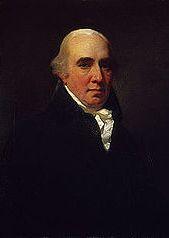Dugald Stewart
杜格尔德·斯图尔特
(1753年11月22日- 1828年6月11日),苏格兰哲学家,出生在爱丁堡。他的父亲,马修斯图尔特(Matthew Stewart)(1715年至1785年),是数学系教授在英国爱丁堡大学(1747年至1772年)。
杜格尔德·斯图尔特在爱丁堡的皇家高中和大学受过教育,他在那里读数学和道德哲学由亚当·弗格森(Adam Ferguson)教授,在1771年,希望获得斯涅尔奖学金和到牛津英语教会继续学习,他前往格拉斯哥,在那里他参加了托马斯·里德(Thomas Reid)的班级。虽然他没有学习过里德的道德理论知识,但是经过努力他完成这方面的学业,并且被里德评价为是一位令人敬佩的风格和学术口才。在格拉斯哥与斯图尔特在同一所房屋居住的阿奇博尔德·莉森(Archibald Alison),他们之间建立起长期的友谊,他们共同志向成为一名作家的志同道合。
在格拉斯哥召开一个单独的会议,在杜格尔德·斯图尔特19岁年龄时学校通知他的父亲,告知他的身体健康情况不好,要求将他转到爱丁堡大学学习数学课,在三年期间由他的父亲教授他的数学,他在1775年当选数学系教授。三年后,亚当·弗格森被任命为秘书长,被委员会派往美国的殖民地,斯图尔特在他的紧急请求下替他发表演讲,因此,自1778年至1779年整个演讲期间,除了他的数学工作,他发表了原来讲授道德课程内容的演讲。在1783年他与海伦·班纳泰恩(Helen Bannatyne)结婚,在1787年马修·斯图尔特上校去世,留下了唯一的儿子,与他一样,在早年都受到蒙博多勋爵(Lord Monboddo)的影响。
在1785年他成功地替代了弗格森道德哲学这个位置,为此他奋斗了二十五年,使道德哲学成为中心的知识和道德的影响力,吸引了很多青年男士,他的名声来自英格兰,甚至从大陆和美国。在他过去的学生中有沃尔特·斯科特爵士(Sir Walter Scott),弗朗西斯·杰弗里(Francis Jeffrey),亨利·托马斯·科伯恩(Henry Thomas Cockburn),弗朗西斯·霍纳尔(Francis Horner),悉尼·史密斯(Sydney Smith),勋爵布鲁厄姆(Lord Brougham),博士托马斯·布朗(Dr. Thomas Brown),詹姆斯·米尔(James Mill),詹姆斯•麦金托什爵士(Sir James Mackintosh)和阿奇博尔·艾莉森先生(Sir Archibald Alison)。围绕道德哲学课程,除了适当的讲授职业道德,还讲授政治哲学或政府理论,并从1800年起,开设了一个单独的政治经济系列讲座,然而针对一般听众并没有当做一门科学。斯图尔特的单单开明的政治教学是不够的,在他的时代,人们热衷法国革命的成功,鉴于他不应怀疑和不满新政。在1788年和1789年的夏天他来到了法国,在那里他会见了Suard,Degbrando,尔雷纳尔,并学会了同情革命运动。
斯图尔特在1790年再次与一名律师和法官的女儿Helen D'Arcy Cranstoun结婚,他的第二任妻子是非常有教养的,对于他的习惯,她经常提出批评,他也从来不反对,他们生了一个儿子和一个女儿,但儿子在1809年的死亡是一个严重打击,作为父亲他离开原来的位子开始退休尽其自己的义务。但是,在此之前,斯图尔特没有闲置成为一个作家,作为一名学生在格拉斯哥,他写了一篇关于梦想的论文,在1792年,他出版了哲学原理第一卷,在1814年出版了第二卷,直到1827年出完第三卷,他在1793年印制自己的教科书,概述的道德哲学,它经历了许多版本,并在同一年,他来到爱丁堡皇家学会创作亚当·斯密生平和著作一书。
罗伯逊历史学家和里德分别阅读后认为这部书类似回忆录,在同一出版机构出版他的这部作品,斯图尔特在1805年出版的小册子,在1806年他接受了年薪300英镑代替退休金的爱丁堡公报的有名无实writership职务,在会议1809-1810期间,当他的儿子的死亡震动不适于他再从事演讲工作,他的位置是在他本人的要求,由托马斯・布朗博士,在1810年被任命相连教授。在布朗死亡1820年斯图尔特继续担任教授职位,这是赋予约翰威尔逊,更好地称为“北方的克里斯托弗”。
从1809年起,斯图尔特主要生活在Kinneil House, Bo'ness,这主要是更接近汉密尔顿公爵。在1810年出版了哲学论文,于1814年又出版了第二卷,1811年的第一部分,并于1821年的第二部分“论文”写在大英百科全书补编中,题为“一般检视的进展形而上学,道德和政治哲学的复兴以来信函。”
于1822年,他被瘫痪,而且恢复了相当程度的健康,足以使他能恢复他的研究。他在1827年出版的第三卷的内容,而在1828年,他正在编写哲学进展和道德力量的前几个星期他突然的死亡,他死在爱丁堡,在卡尔顿山设立了纪念他的纪念碑,为了纪念他将爱丁堡大学的查尔斯街改为杜格尔德·斯图尔特大街。
Dugald Stewart:
Dugald Stewart (November 22, 1753 - June 11, 1828), Scottish philosopher, was born in Edinburgh. His father, Matthew Stewart (1715 - 1785), was professor of mathematics in the University of Edinburgh (1747 - 1772).
Life and works
Dugald Stewart was educated in Edinburgh at the Royal High School and the University, where he read mathematics and moral philosophy under Adam Ferguson. In 1771, in the hope of gaining a Snell exhibition and proceeding to Oxford to study for the English Church, he went to Glasgow, where he attended the classes of Thomas Reid. While he owed to Reid all his theory of morality, he repaid the debt by giving to Reid's views the advantage of his admirable style and academic eloquence. In Glasgow Stewart boarded in the same house with Archibald Alison, author of the Essay on Taste, and a lasting friendship sprang up between them.
After a single session in Glasgow, Dugald Stewart, at the age of nineteen, was summoned by his father, whose health was beginning to fail, to conduct the mathematical classes in the University of Edinburgh. After acting three years as his father's substitute he was elected professor of mathematics in conjunction with him in 1775. Three years later Adam Ferguson was appointed secretary to the commissioners sent out to the American colonies, and at his urgent request Stewart lectured as his substitute. Thus during the session 1778 - 1779, in addition to his mathematical work, he delivered an original course of lectures on morals. In 1783 he married Helen Bannatyne, who died in 1787, leaving an only son, Colonel Matthew Stewart. In his early years he was influenced by Lord Monboddo, with whom he corresponded.
In 1785 he succeeded Ferguson in the chair of moral philosophy, which he filled for twenty-five years, making it a centre of intellectual and moral influence. Young men were attracted by his reputation from England, and even from the Continent and America. Among his pupils were Sir Walter Scott, Francis Jeffrey, Henry Thomas Cockburn, Francis Horner, Sydney Smith, Lord Brougham, Dr. Thomas Brown, James Mill, Sir James Mackintosh and Sir Archibald Alison. The course on moral philosophy embraced, besides ethics proper, lectures on political philosophy or the theory of government, and from 1800 onwards a separate course of lectures was delivered on political economy, then almost unknown as a science to the general public. Stewart's enlightened political teaching was sufficient, in the times of reaction succeeding the French Revolution, to draw upon him the undeserved suspicion of disaffection to the constitution. The summers of 1788 and 1789 he spent in France, where he met Suard, Degbrando, Raynal, and learned to sympathize with the revolutionary movement.
In 1790 Stewart married Helen D'Arcy Cranstoun, daughter of a lawyer and judge. His second wife was well-born and accomplished, and he was in the habit of submitting to her criticism whatever he wrote. They had a son and a daughter, but the son's death in 1809 was a severe blow to his father, and brought about his retirement from the active duties of his chair. Before that, however, Stewart had not been idle as an author. As a student in Glasgow he wrote an essay on Dreaming. In 1792 he published the first volume of the Elements of the Philosophy of the Human Mind; the second volume appeared in 1814, the third not till 1827. In 1793 he printed a textbook, Outlines of Moral Philosophy, which went through many editions; and in the same year he read before the Royal Society of Edinburgh his account of the Life and Writings of Adam Smith.
Similar memoirs of Robertson the historian and of Reid were afterwards read before the same body and appear in his published works. In 1805 Stewart published pamphlets defending John Leslie against the charges of unorthodoxy made by the presbytery of Edinburgh. In 1806 he received in lieu of a pension the nominal office of the writership of the Edinburgh Gazette, with a salary of £300. When the shock of his son's death incapacitated him from lecturing during the session of 1809-1810, his place was taken, at his own request, by Dr Thomas Brown, who in 1810 was appointed conjoint professor. On the death of Brown in 1820 Stewart retired altogether from the professorship, which was conferred upon John Wilson, better known as "Christopher North".
From 1809 onwards Stewart lived mainly at Kinneil House, Bo'ness, which was placed at his disposal by the Duke of Hamilton. In 1810 appeared the Philosophical Essays, in 1814 the second volume of the Elements, in 1811 the first part and in 1821 the second part of the "Dissertation" written for the Encyclopaedia Britannica Supplement, entitled "A General View of the Progress of Metaphysical, Ethical, and Political Philosophy since the Revival of Letters."
In 1822 he was struck with paralysis, but recovered a fair degree of health, sufficient to enable him to resume his studies. In 1827 he published the third volume of the Elements, and in 1828, a few weeks before his death, The Philosophy of the Active and Moral Powers. He died in Edinburgh, where a monument to his memory was erected on Calton Hill. His memory is also honoured by the newly constructed Dugald Stewart Building at the University of Edinburgh, on Charles Street.
